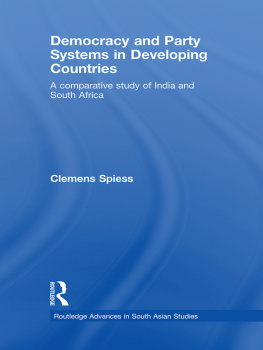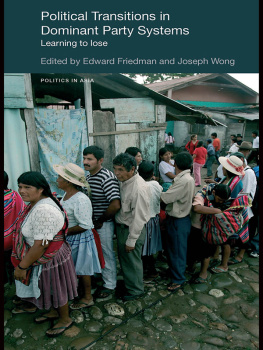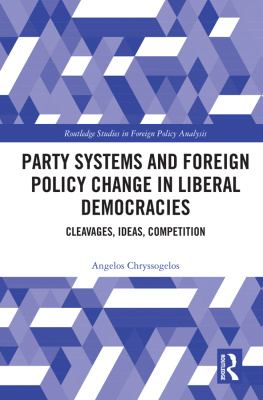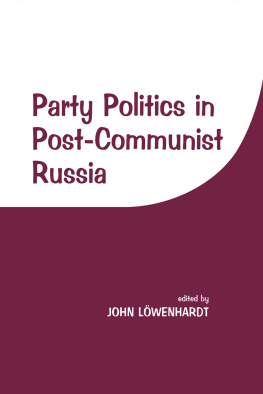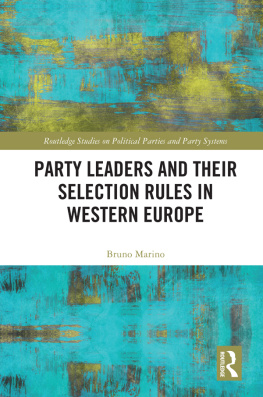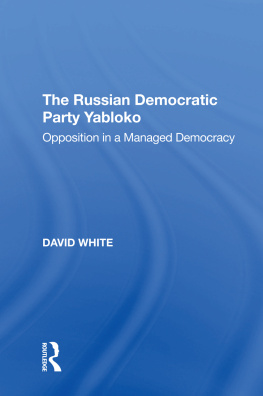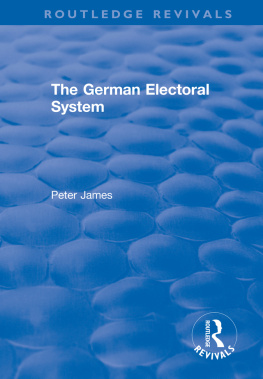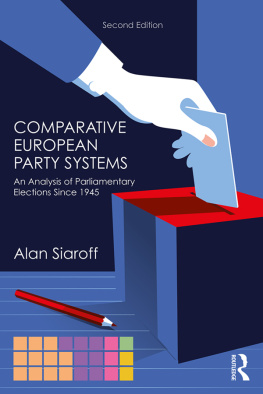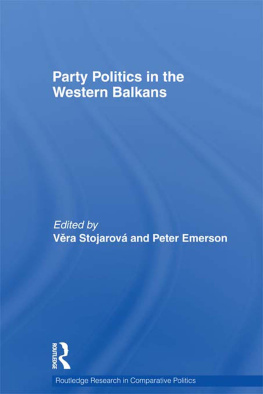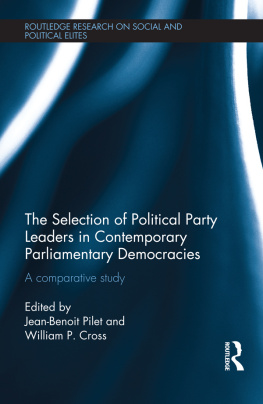Democracy and Party Systems in Developing Countries
This book examines and compares the emergence, development and impact of the party systems in post-colonial India and post-apartheid South Africa. It sheds light on the crucial role and function of party systems in democratising developing countries.
Although often described as political miracles or empirical anomalies, both countries actually figure prominently in party system and democratic theory due to their regional importance and the important role the party system plays in their political trajectory. The author employs a diachronic comparison of the two party systems, with a distinct focus on the role of party agency in the shaping and maintenance of one-party-dominance and on the role of the two party systems as independent variables. Highlighting the similarities and differences between the two systems, he examines whether the lessons learned from the Indian experience, in terms of the function and effects of the countrys post-independent party system and the role of party agency therein, are applicable to South Africa.
This book will be of interest to academics working in the field of democracy, comparative politics and development in general, and South Africa and South Asia in particular.
Clemens Spiess is lecturer at the University of Heidelbergs South Asia Institute, Germany. His research interests include comparative politics, party theory and the politics of South Asia and Southern Africa.
Routledge Advances in South Asian Studies
Edited by Subrata K. Mitra
South Asia Institute, University of Heidelberg, Germany
South Asia, with its burgeoning, ethnically diverse population, soaring economies, and nuclear weapons, is an increasingly important region in the global context. The series, which builds on this complex, dynamic and volatile area, features innovative and original research on the region as a whole or on the countries. Its scope extends to scholarly works drawing on history, politics, development studies, sociology and economics of individual countries from the region as well as those that take an interdisciplinary and comparative approach to the area as a whole or to a comparison of two or more countries from this region. In terms of theory and method, rather than basing itself on any one orthodoxy, the series draws broadly on the insights germane to area studies, as well as the tool kit of the social sciences in general, emphasising comparison, the analysis of the structure and processes, and the application of qualitative and quantitative methods. The series welcomes submissions from established authors in the field as well as from young authors who have recently completed their doctoral dissertations.
- Perception, Politics and Security in South Asia
The Compound Crisis of 1990
P. R. Chari, Pervaiz Iqbal Cheema and Stephen Philip Cohen
- Coalition Politics and Hindu Nationalism
Edited by Katharine Adeney and Lawrence Saez
- The Puzzle of Indias Governance
Culture, context and comparative theory
Subrata K. Mitra
- Indias Nuclear Bomb and National Security
Karsten Frey
- Starvation and Indias Democracy
Dan Banik
- Parliamentary Control and Government Accountability in South Asia
A comparative analysis of Bangladesh, India and Sri Lanka
Taiabur Rahman
- Political Mobilisation and Democracy in India
States of emergency
Vernon Hewitt
- Military Control in Pakistan
The parallel state
Mazhar Aziz
- Sikh Nationalism and Identity in a Global Age
Giorgio Shani
- The Tibetan Government-in-Exile
Politics at large
Stephanie Roemer
- Trade Policy, Inequality and Performance in Indian
Manufacturing
Kunal Sen
- Democracy and Party Systems in Developing Countries
A comparative study of India and South Africa
Clemens Spiess
Democracy and Party Systems in Developing Countries
A comparative study of India and South Africa
Clemens Spiess

First published 2009
by Routledge
2 Park Square, Milton Park, Abingdon, Oxon OX14 4RN
Simultaneously published in the USA and Canada
by Routledge
270 Madison Ave, New York, NY 10016
Routledge is an imprint of the Taylor & Francis Group, an informa business
This edition published in the Taylor & Francis e-Library, 2008.
To purchase your own copy of this or any of Taylor & Francis or Routledges collection of thousands of eBooks please go to www.eBookstore.tandf.co.uk.
2009 Clemens Spiess
All rights reserved. No part of this book may be reprinted or reproduced or utilised in any form or by any electronic, mechanical, or other means, now known or hereafter invented, including photocopying and recording, or in any information storage or retrieval system, without permission in writing from the publishers.
British Library Cataloguing in Publication Data
A catalogue record for this book is available from the British Library
Library of Congress Cataloging in Publication Data
A catalogue record for this book has been requested
ISBN 0-203-88559-7 Master e-book ISBN
ISBN10: 0-415-46809-4 (hbk)
ISBN10: 0-203-88559-7 (ebk)
ISBN13: 978-0-415-46809-1 (hbk)
ISBN13: 978-0-203-88559-8 (ebk)
Illustrations
Figures
Analytical framework of a one-party-dominant system to be deployed
Percentage of votes of the INC relative to the largest non-Congress Party or coalition (Lok Sabha elections 19522004)
Party identification in South Africa, main parties (19942002; percentage of respondents who say they feel close to a party)
Electoral performance of the ANC and second largest party in National/Provincial (1994, 1999) and Local elections (19951996, 2000, 2006)
Basic (classic) structural chart of the INC
The tripartite alliances symbiotic and synergetic coherence during the 1990s
Basic organisational structure of the ANC
The Congress systems pattern of interaction between the dominant party and opposition parties
Number of riots per million population in India, 19521998
The circular mode of operation of the Congress system
Tables
Electoral data for India (19521967) and South Africa (19942004)
Selected indicators of socio-cultural differentiation in India (% of total)
How voting decisions are reached India 1967
Party identification (1967), Indian main parties (% of respondents who say they feel close to a party)
Lok Sabha elections (19521967), seats/vote share of main parties
Lok Sabha elections (19521967), seats/vote share of main parties by main States (with at least 18 seats)
Lok Sabha elections (19522004), % of valid vote cast/seats won by parties represented
Selected indicators of socio-cultural differentiation in South Africa
Population group-wise constitution of the ANCs and N(N)Ps vote in the general elections of 1994 and 1999
Electoral performance (% of votes) of main parties and seats won in South African National Assembly and Provincial Legislature elections (19941999)
Electoral performance (% of votes) of main parties and seats won in South African National Assembly elections 2004
South Africa: Opinion Poll 99 competence to run the national government

